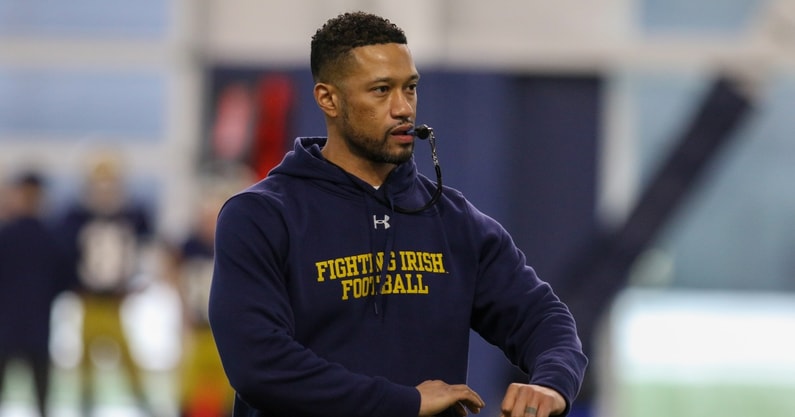Marcus Freeman opens up about the future of college football, NIL cap idea

First-year Notre Dame head coach Marcus Freeman joined ESPN’s Get Up live on the set on Thursday morning and addressed the concerns many coaches have brought up about the direction and future of college football.
Unlike coaches with some tenure like Nick Saban, Freeman isn’t quite as opinionated.
“I’m not concerned,” Freeman said. “I believe that the higher-ups will continue to make sure that we do the right things for student-athletes. It can kind of go all over the place right now but my job is to focus on, ok, within the rules, what can we at Notre Dame do to maximize opportunities for our players.”
This week, Lane Kiffin made headlines when he proposed a cap on NIL to establish some uniformity across the NCAA. While the Fighting Irish’s new skipper believes some rules and restrictions would benefit student-athletes, he’s still getting a handle on his new gig – not trying to make waves.
“At some point, the ability to make rules and restrictions that are put in place to really help student-athletes and your program to not get out of control, that’s really important,” Freeman said. “I’m not too overly opinionated on it. I’ve been doing this head coach thing for maybe 7-8 months, so I’m really focused on getting this team prepared. Guys like Lane Kiffin and Nick Saban who’ve been doing it for so long, I’m sure they have a strong opinion about it.”
CLICK HERE to subscribe for FREE to the On3 YouTube channel
Lane Kiffin proposes NIL cap
In an appearance on First Take on ESPN, Ole Miss head coach Lane Kiffin expanded on his salary cap idea.
Top 10
- 1Breaking
Jackson Arnold
OU QB to enter transfer portal
- 2New
Ben Herbstreit
POTUS sends heartfelt note
- 3
Lincoln Riley
USC coach talks job rumors
- 4Hot
Jahkeem Stewart
USC lands five-star DL
- 5
Mike Gundy status
BOR meeting sparks speculation
“I don’t have the perfect plan for it,” Kiffin said. “Just in answering the question, there should be some sort of cap. Because if you look at professional sports – which now we are in a professional sport – we have free agency for the players, they get paid to play without having long-term contracts.”
Continuing, Kiffin believes the benefits outweigh the negatives in this particular situation.
“My point of capping it was, at least then there would be a way to manage it,” explained Kiffin. “Remember, too, not only is there not a cap, we have collective groups – donors – at places paying players and picking the players to come. Supposedly, without communication with the coaches. How would that system work in professional sports like the NFL? Everybody has a different cap, and the coaches and the general managers aren’t picking and choosing how they divide that cap for the players. That doesn’t make a whole lot of sense to me.
“From the beginning of this, if you understood and you looked at it, you could see these problems coming. I said it, you’ve basically legalized cheating. I said that I think the first week this came out. We are where we are.”
On3’s Stephen Samra contributed to this report.